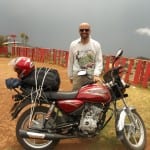Dr. Collins on his experiences as a Fulbright fellow
Nicholson School of Communication Associate Professor Dr. Steve Collins recently returned from East Africa, where he was living for nine months as a Fulbright scholar. He spent this past academic year conducting research on the factors that influence the quality and content of journalism there.
“Many organizations are investing money to improve the quality of journalism in Africa based on the assumption that efforts to increase democracy and development on the continent can’t thrive without a free and responsible press,” Collins said. “My research assumes that such efforts are more likely to succeed if we truly understand the factors that shape news production in these countries.”
From August 9 through the 12 Collins will be attending and presenting his research at the Association for Education in Journalism and Mass Communication conference in Chicago. His presentations focus on three different topics starting with “Mediating the African Message: Social Influences on a Ugandan Newspaper” then “Gatekeeping in East Africa: Organizational Structure and Reporter Gender as Potential Influences on Newspaper Content” and finally “Seeing the world through a different lens: Examining visual gatekeeping via East African photojournalists’ experiences with news organizations.”
Click on any image to view it larger.
Collins spent hundreds of hours in newsrooms in East Africa conducting in-depth interviews with the staff, training journalists, researching the types of stories the paper printed, working on the copy desk and accompanying reporters on assignments.
“I have so much respect for all of the journalists I dealt with in Africa,” Collins said. “Being a journalist is hard, living in Africa is hard and you put those two things together and it is and incredibly hard situation.”
He explains the difficulties journalists in Africa face in his presentation “Mediating the African Message: Social Influences on a Ugandan Newspaper,” which include ethnicity (of journalists and sources), a pay system that rewards quantity over quality, a reliance on sources willing to “facilitate” reporters, and a newsroom culture that promotes self-censorship.
After spending time within one major Ugandan newspaper, Collins began comparing and contrasting two newspapers – one owned by the government and one which is seen as the opposition paper. While the results of his research suggest that the opposition paper includes more voices Collins found both papers to be thinly sourced and lacking representation from women. Collins hopes to return to Africa to focus on this line of research further.
“I’d like to focus more on who the sources are and how many points of view are being represented in one story,” Collins said.
For now, his research on the two newspapers will be presented in “Gatekeeping in East Africa: Organizational Structure and Reporter Gender as Potential Influences on Newspaper Content.”
“Seeing the World Through a Different Lens: Examining Visual Gatekeeping via East African Photojournalists Experiences with News Organizations” focuses on interviews Collins conducted with four Western photographers working in East Africa. The research provides their views on the way news content is produced and distributed from the East African countries of Uganda and Kenya.
Collins said hearing these journalists talk about how difficult it is to sell their work was disheartening.
“Almost nobody who is a freelance photojournalist there can support themselves by doing straight news,” Collins said. “If there is a peaceful election in east Africa you are not going to make any money off of it, but if all hell breaks loose then you’ll make some money.”
Collins describes his time in Africa as “life changing” and expects that his experiences there will change how he teaches his international media class.
“I think it is going to be such a fundamentally different experience for students,” Collins said. “Having now lived abroad and embedded with international journalists I’ll bring a different perspective to the class.”






